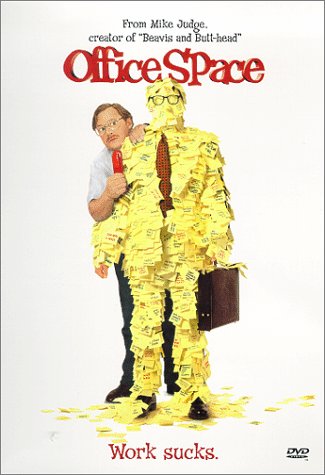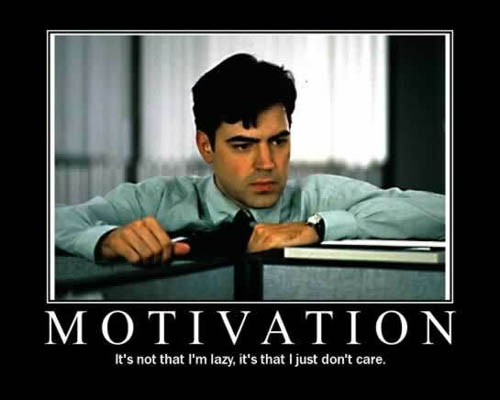 One of my favorite movies of all time is Office Space. There’s so much wonderful satire packed into 89 minutes that echos the absurdities of the world we live in… you know, the real world after college that you don’t leave until you retire. The one with bosses named Bob, TPS reports, and never ending rows of cubicles.
One of my favorite movies of all time is Office Space. There’s so much wonderful satire packed into 89 minutes that echos the absurdities of the world we live in… you know, the real world after college that you don’t leave until you retire. The one with bosses named Bob, TPS reports, and never ending rows of cubicles.
If you haven’t seen Office Space, first of all shame on you, but if you have you’ll most likely understand the sentiments I have for it, especially from the angle of a person who is trying to avoid the rat race, doesn’t believe in cubicles, and would much rather visit restaurants that don’t require flair. Here some of the many lessons I learned when watching one of the best movies of all time – Office Space.
1. There’s no Such Thing as Bad PR in Your Career
After Peter is hypnotized at the beginning of the movie he begins to simply not care. He eloquently describes it to the two consultants that have been hired (the Bobs) to get rid of a large part of the staff by saying:
“It’s not that I’m lazy it’s that i just don’t care.”
Peter doesn’t show up on time, he admits to working a solid 15 minutes a week, and complains about his bosses to the consultants, but the Bob’s interpret this as genius. Peter is brutally honest about the company and his place in it. This is how the Bobs react:
“Now we had a chance to meet this young man, and boy that’s just a straight shooter with upper management written all over him.”
Now this could possibly work for your career too. If you’re simply one of the drones, STAND OUT. You’ve heard the phrase “There’s no such thing as bad PR,” so use the opportunity of being an outlier to get a position that doesn’t require you to be a robot. If not, you’re in the wrong job anyways so be honest with yourself and move on.
2. Most People Don’t Have a Clue About Their Childhood Dreams or What They’d do with a Million Dollars
Throughout the movie Peter asks different characters what their childhood dreams are or what they’d do if they had a million dollars. He got mixed reactions, but basically it showed that nobody had a clue what to do with their money or their dreams. Below is his conversation with his neighbor Lawrence about having a million dollars. I hope you can find a better answer to this question:
Peter: What would you do if you had a million dollars?
Lawrence: I’ll tell you what I’d do, man: two chicks at the same time, man.
Peter: That’s it? If you had a million dollars, you’d do two chicks at the same time?
Lawrence: Damn straight. I always wanted to do that, man. And I think if I were a millionaire I could hook that up, too; ’cause chicks dig dudes with money.
Later on at work Peter brings up the question of childhood dreams to his co-workers:
Peter: Our high school guidance counselor used to ask us what you’d do if you had a million dollars and you didn’t have to work. And invariably what you’d say was supposed to be your career. So, if you wanted to fix old cars then you’re supposed to be an auto mechanic.
Samir: So what did you say?
Peter: I never had an answer. I guess that’s why I’m working at Initech.
Michael: No, you’re working at Initech because that question is bullshit to begin with. If everyone listened to her, there’d be no janitors, because no one would clean shit up if they had a million dollars.
Samir: You know what I would do if I had a million dollars? I would invest half of it in low risk mutual funds and then take the other half over to my friend Asadulah who works in securities…
Michael: Samir, you’re missing the point. The point of the exercise is that you’re supposed to figure out what you would want to do if…
[printer starts beeping]
Michael: “PC Load Letter”? What the fuck does that mean?
Samir illustrates a great point here. Many of us would simply invest the million dollars to make more money. But once we have enough money to do what we want, we don’t really know what we’d do with our time! For some odd reason it seems that as people progress in the working world they lose their passions and affinity to do other exciting things that aren’t work related. What would you do with a million dollars and what were your childhood dreams?
3. Work Makes People do Things They Don’t Want
Work is work because it’s often things you wouldn’t do. When Peter is talking to Joanna about her work at Chotchkie’s as a waitress he discusses doing things you don’t like in the name of work. Essentially work is slavery because it makes you do things you don’t want.
Peter: “Doesn’t it bother you that you have to get up in the morning and you have to put on a bunch of pieces of flair?”
Joanna: “Yeah, but I’m not about to go in and start taking money from the register.”
Peter: “Well, maybe you should. You know, the Nazis had pieces of flair that they made the Jews wear.”
Peter also gets to wear some “flair” on Fridays for Hawaiian T-Shirt Day.
Lumbergh: “Oh, and remember: next Friday… is Hawaiian shirt day. So, you know, if you want to, go ahead and wear a Hawaiian shirt and jeans.”
4. Big Companies are Often Bogged Down With Policies, Procedures, and Pointless Tasks
The reoccurring theme of TPS reports in “Office Space” illustrates how ridiculous office policies can be. Quite frankly TPS reports are a waste of time. Do you have any TPS reports at your work that drive you crazy? Here’s where Dom, one of Peter’s eight bosses, asks him about a new procedure with the TPS Reports.
Dom: Hi, Peter. What’s happening? We need to talk about your TPS reports.
Peter: Yeah. The coversheet. I know, I know. Uh, Bill talked to me about it.
Dom: Yeah. Did you get that memo?
Peter: Yeah. I got the memo. And I understand the policy. And the problem is just that I forgot the one time. And I’ve already taken care of it so it’s not even really a problem anymore.
Dom: Ah! Yeah. It’s just we’re putting new coversheets on all the TPS reports before they go out now. So if you could go ahead and try to remember to do that from now on, that’d be great. All right!
One of the many benefits of working for yourself is that you aren’t bogged down by such policies. Big companies aren’t as lean, agile or open to change as the business you can start. Realize that this is one of your competitive advantages starting out small. Otherwise just accept that if you work in a big company you’ll be doing TPS reports until you retire.
5. Your Purpose is Not to Sit in a Cubicle for the Next 30 Years.
After being hypnotized Peter starts to “get it” and has his ah-ha moment. He tells his friends:
“we don’t have a lot of time on this earth! Human beings were not meant to sit in little cubicles staring at computer screens all day and listening to eight different bosses drone on about mission statements.”
This goes back to purpose. What is our purpose? If not to sit in a cubicle all day, then what? People are happiest when they feel like they’re accomplishing something, when they’re outside, or when they’re with other people. A cubicle removes all these elements and in my eyes, is the equivalent to a miniature prison. At the end of the movie Peter doesn’t sit in a cubicle anymore and instead picks up a job in construction. Sometimes manual labor and exercise can be a lot more gratifying even if it doesn’t pay as much. This is what Peter has to say about manual labor to his neighbor Lawrence:
“This isn’t so bad, huh? Makin’ bucks, gettin’ exercise, workin’ outside.”
I wholeheartedly agree; Some of the most gratifying jobs I’ve ever had were ones that required physical labor. The feeling of actually accomplishing something and being tired at the end of the day has a unique sense of reward that can’t be duplicated by pushing papers in a cubicle.
In Conclusion:
Office Space is a great satire of the office culture, especially in America. I’m not sure if there’s a phobia for this particular type of environment, but if there is I might have it. Cubiclephobia perhaps?
Anyways, if you haven’t watched the movie yet, check it out and let me know what you think.
What other lessons are there in Office Space that I haven’t touched on?










This was an awesome movie! One of the few that I can watch over and over again. Why did you have to mention it Ryan? Now I can’t get the “Damn it feels good to be a gangsta!” track out of my head! Regarding the cubicle culture, I have to admit that I’m probably one of a small minority that doesn’t mind it as much. When I graduated from college, I was thrown in a sales-y environment, and I simply loathed it! I knew I had to get out of it because I used to get nightmares about it. Even… Read more »
I hope that your site is being recieved well. I’m typically a casual reader, but it’s refreshing to come across a good blog with fresh content…especially on a lazy lunchtime Friday! Keep up the great work!!
The FTB Blog Team leader
.-= The FTB Blog Team´s last blog ..WE NEED A GOOD MLM OPPORTUNITY!! =-.
Awesome article, Ryan. This is one of my all-time favorite movies and I’m always quoting lines at work. We call the corporate management consultants “The Bobs” and when I ask someone to do something for me I’ll add “Yeah, if you could just do that for me that would be grrrrreat…”
I think you’re on the right path, avoid cubicles like the plague and keep your butt in Hawaii.
.-= David @ MBA briefs´s last blog ..You, Inc.: 5 ways to manage your life more like a business =-.
Great article, looking forward to more.
I’m glad you all like this movie! If I was stuck on a desert island this would probably be the one movie I’d want with me… partially so it could remind me that being on a desert island isn’t so bad compared to the alternative and partially because it’s just so funny. “It was a “Jump to Conclusions” mat. You see, it would be this mat that you would put on the floor… and would have different CONCLUSIONS written on it that you could JUMP TO.” Do you think we should try to develop and market this as an actual… Read more »
So many good quotes and lessons in Office Space! I watched this in grad school about 1 year ahead of getting my first job, and it actually influenced my decision not to work in a cubicle based work environment.
As for our temperamental fax machine, I won’t disclose what happened to it, but I will admit it was a great off the books, team building exercise!
.-= Matt SF´s last blog ..Maybe a Little Obsessive Compulsive Behavior is a Good Thing =-.